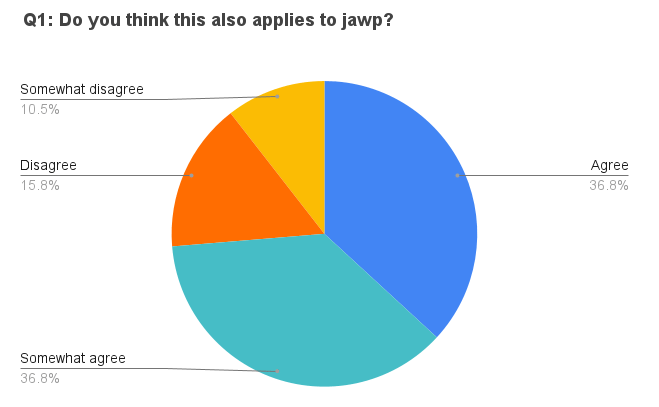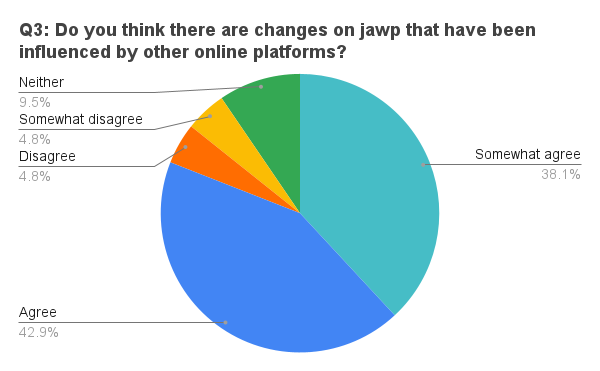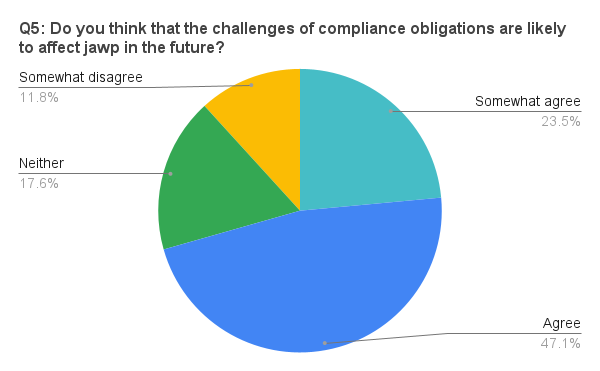The Wikimedia Foundation develops an Annual Plan every year, where we outline our key goals and priorities and explain the work we will set out to do. Recognizing that the Foundation’s work supports and is supported by the Wikimedia communities, we actively seek input from communities when creating our plans. This year, one of the ways we sought input from communities was through the Talking:2024 initiative, a series of conversations where community members were invited to schedule a time to talk with Foundation leadership, staff, and trustees. When we announced the Annual Planning work on wikis, we also posted specific questions, aiming to better listen to the voices of individual contributors. The post was localized in various wikis and, in this article, we share the example of the Japanese Wikipedia (jawp).
The following are the questions asked with shared responses; in the form of a pie chart for the multiple questions Q1, 3, 5 and a selected feedback representing the overall trend for 2, 4, 6. Some of the feedback directly connected with a few of the Foundation’s ongoing and upcoming work by Product & Tech, for which comments we have added in.
Throughout the survey responses a key theme that emerged was around newcomers – ranging from how to better support quality edits to how to bring in new generations of contributors and admins.
Trustworthiness of the Content
Trustworthiness of the content (articles), supported by the Five Pillars, Verifiability, etc is the uniqueness of Wikimedia, and has been the driving force for many users to stay active on the Wikimedia projects.
Q1: Do you think this also applies to jawp? – 73.6% noted ‘agree’ or ‘somewhat agree’
Q2: Do you have any suggestions on how to help grow trustworthy content more quickly, while still adhering to the quality standards agreed upon within jawp?
“I feel that Wikipedia’s noble principles are the reason for distinguishing Wikipedia from mere curation sites.”
“More attention and awareness need to be brought to people that Wikipedia only publishes verifiable information.”
“Review of communication style within the community that is strict to the extreme norms.”
“I’m noticing new editors who edit without providing sources. They often edit based on uncertain information such as external social networking sites.”
Last January, at Japanese Wikipedia, the Editing team released “References Check” as a test. This feature encourages newcomers and unregistered users to add a source when they add a paragraph. These edits are tagged and can be found back in Recent Changes for instance, in particular when the user decided not to add a citation.
Previously, 25% of new users were adding a citation by themselves, without being asked. With References Check, this number increases to 49.7%.
The Editing team works on other “checks” and they are looking for ideas that would help your community.
To continue to attract users and viewers
In order to keep attracting users and viewers, there is fierce competition among large online platforms (a term that refers to large online service infrastructures, especially social networking sites and giant tech companies which greatly influences how we get information) for users and viewers.
Q3: Do you think there are changes on jawp that have been influenced by other online platforms? – 81% noted ‘agree’ or ‘somewhat agree’
Q4: Do you have any opinions or questions about how to reach new users and readers, especially the younger generation, to ensure that jawp can continue in the way they should be in the future?
“It would be nice to have something like the beginner’s mark on a car license.”
It is possible to filter or highlight beginners in Recent Changes or Watchlist, by applying a coloured filter (for example with newcomers highlighted in green).
“I believe it is also important to attract users of all ages, including the elderly. Of course it is important to involve the younger generation, but the reality is that Japan is an aging society.”
“Hold editing events at educational institutions can be held to show the younger generation that editing can be done by anyone”
“The younger generation does not understand verifiability. They tend to seek for truth or not. This may be an educational issue, not a wikipedia issue.”
The Foundation also sees the trend of how younger generations think and feel differently about information and has been developing Future Audience projects, further explained in this Diff blog.
Security and Compliance
The battle against increasingly large-scale and diverse cyber-attacks against Wikimedia is also becoming something frequent. At the same time, Wikimedia faces evolving compliance obligations (It refers to compliance with laws and regulations as well as social norms in order to conduct service in a fair and impartial manner here) as policy makers around the world focus on how to handle personal information and share information online.
Q5: Do you think that the challenges of compliance obligations are likely to affect jawp in the future? – 70.6% noted ‘agree’ or ‘somewhat agree’
Q6: Do you have any comments or questions about how to maintain the sustainability of the jawp related to security and compliance?
“It would be good if Wikimedia could make an appeal that ‘Wikimedia is committed to compliance’ during fundraising campaigns and other such events.”
“As well as anti-vandalism measures, I’d like to see AI be used to handle the situation automatically to some extent”
There is a work in progress model of Automoderator, a tool that analyzes recent changes and reverts bad edits which can be a very powerful tool.
We also would like to highlight that restrictions toward IP users were raised in response to multiple questions.
“Since it is more common for IP address users (especially variable IPs) to edit against the 5 pillars and verifiability, it would be better to prohibit IP address users from editing if the purpose is to maintain a certain level of quality”
“From a security and compliance perspective, I think the most urgent issue for Jawp is to promote tighter regulation of open proxies”
“It seems to me that vandals who are not long-term abusers (LTA) are more likely to be IP address users than newly registered users. In order to reduce not only vandalism, but also posts with compliance problems, I think that banning IP address users from editing would reduce the burden on the community to deal with them and maintain sustainability.”
This is a really interesting topic. Two Wikipedias, Portuguese and Persian, have already disabled unregistered editing. The results are mixed. Although the number of vandalisms dropped, the collateral effect on good-faith contributions is concerning (see the details here). What’s more, the introduction of temporary accounts as a replacement for IP editing will also change the experience of unregistered editing, communication between registered Wikipedians and temporary account holders, and patrollers’ anti-abuse workflows. Taking all this into account, we do not recommend that communities disable unregistered editing. We invite everyone interested in the topics of anonymous editing, anti-vandalism, and related aspects to contact the Trust and Safety Product team.
Product and Technology OKRs share the actual project plans, and projects such as WE4 and WE4.2 are relevant to the issue of the IP users, and they show that jawp is not alone in the challenge of the administrators’ overcapacity which was mentioned in the feedback.
“Due to the under-representation of jawp administrators, vandalism is not being dealt with properly”
We know the problem of patrollers, functionaries, and admins being burdened with their anti-vandalism work. As we mentioned, we will introduce temporary accounts as a replacement for IP editing. For different reasons, there might be a risk that administrators would continue to be burdened if we didn’t address different related aspects properly. So we decided to work on a variety of projects to support functionaries in dealing with abuse and vandalism from the future temporary accounts. This includes changes to abuse filters, CheckUser tools, global blocks for temporary accounts, and more. In the coming fiscal year, we will look for ways to mitigate abusive behavior without relying solely on IP addresses. That will involve using more signals to detect and mitigate abuse. We will have more details on-wiki later this month with proposed projects.
How the Foundation can better connect with the individual contributors to shape the Annual Planning is an ongoing journey, and we hope to continue discussing with you on how we can improve this process.

Can you help us translate this article?
In order for this article to reach as many people as possible we would like your help. Can you translate this article to get the message out?
Start translation


